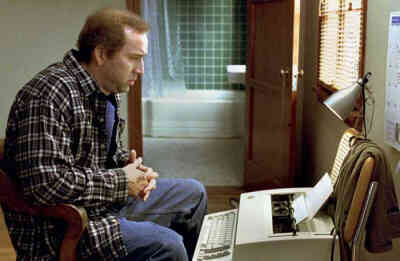 Dan Friedman
Dan FriedmanThe Charlie Kaufman of Adaptation is, like Barris, a success - and yet, not a successful success. Malkovich has made him famous, but also created a fictional identity (the genius screenwriter Charlie Kaufman) which, unlike Barris's spy persona, seems to intimidate and threaten its subject. Kaufman's attempts to escape this invasion of his life by fiction fail; the twin dies, the girlfriend isn't his girlfriend, The Orchid Thief becomes the Charlie Kaufman story. "Charlie Kaufman" wants to deal with The Orchid Thief responsibly - to make a movie just about flowers - but he realizes he can't do it. The only movie to be made is "Donald's" escapist fantasy. Lies, not truth - and in 'real life' as well, where Donald succeeds with women, parties till late and writes with ease. Adaptation becomes a documentary about how the twins adapt to one another's success.
The paradox of the film is that "Charlie Kaufman's" only escape from this circuit of fiction and fact is the part of his personality that doesn't want to escape, that wants to deal with the beauty of plants. The plants have what Sartre calls a 'facticity,' a quality in and of themselves, which - as Sartre also said - is what differentiates the something-ness of objects from the nothingness of human personae.
 Plants, though, are not static. They adapt, into infinite varieties.
There are, of course, many layers of adaptation in the film. First,
there is Charlie, who is having to adapt to his status having changed,
on the basis of his fame, from non-entity to genius.
Second, there is his futile attempt to adapt Susan Orlean's book into a screenplay
(ironically, the film changes the book so much that the WGA no longer classifies
Adaptation as an adaptation). Third, there is the social adaptation we as individuals must undergo to fit into society and to our social, as well as physical, environment. Fourth is our Darwinian adaptation as a species, through the process of evolution -- especially in a stunningly realized sequence that graphically answers Cage/Charlie's question "How did I get here?" in a way that, while seeming to provide a cosmic answer to Cage's existential question, actually reinforces the despairing feeling behind it.
Plants, though, are not static. They adapt, into infinite varieties.
There are, of course, many layers of adaptation in the film. First,
there is Charlie, who is having to adapt to his status having changed,
on the basis of his fame, from non-entity to genius.
Second, there is his futile attempt to adapt Susan Orlean's book into a screenplay
(ironically, the film changes the book so much that the WGA no longer classifies
Adaptation as an adaptation). Third, there is the social adaptation we as individuals must undergo to fit into society and to our social, as well as physical, environment. Fourth is our Darwinian adaptation as a species, through the process of evolution -- especially in a stunningly realized sequence that graphically answers Cage/Charlie's question "How did I get here?" in a way that, while seeming to provide a cosmic answer to Cage's existential question, actually reinforces the despairing feeling behind it.
Finally, the film itself adapts -- changes itself --
in order to come to a conclusion. The film that Charlie wanted to make,
or felt capable of making, is unfinishable. Charlie himself recognizes
that, and, in a fit of desperation, asks Donald to have a look at the
screenplay. So, from the point when Donald takes up the script in the hotel room,
Adaptation turns into Donald's film, including car chases, sexual intrigue, drugs and the twin's own gruesome death. By buying into every nostrum prescribed by script guru Robert McKee (beautifully played right down the line of seriousness by Brian Cox), Donald-rather than Charlie-finishes the movie with a blaze of drama that Charlie could never pull off.



strasbourg
cathedral
Michael Shurkin
the other rally
Sam Brody
what the world is &
what to do about it
Jay Michaelson
Treasure
Ron Mohring
sha'atnez
Abraham Mezrich
what is charlie kaufman doing?
Dan Friedman
josh visits the
holocaust museum
Josh Ring
saddies
David Stromberg
about zeek
archive